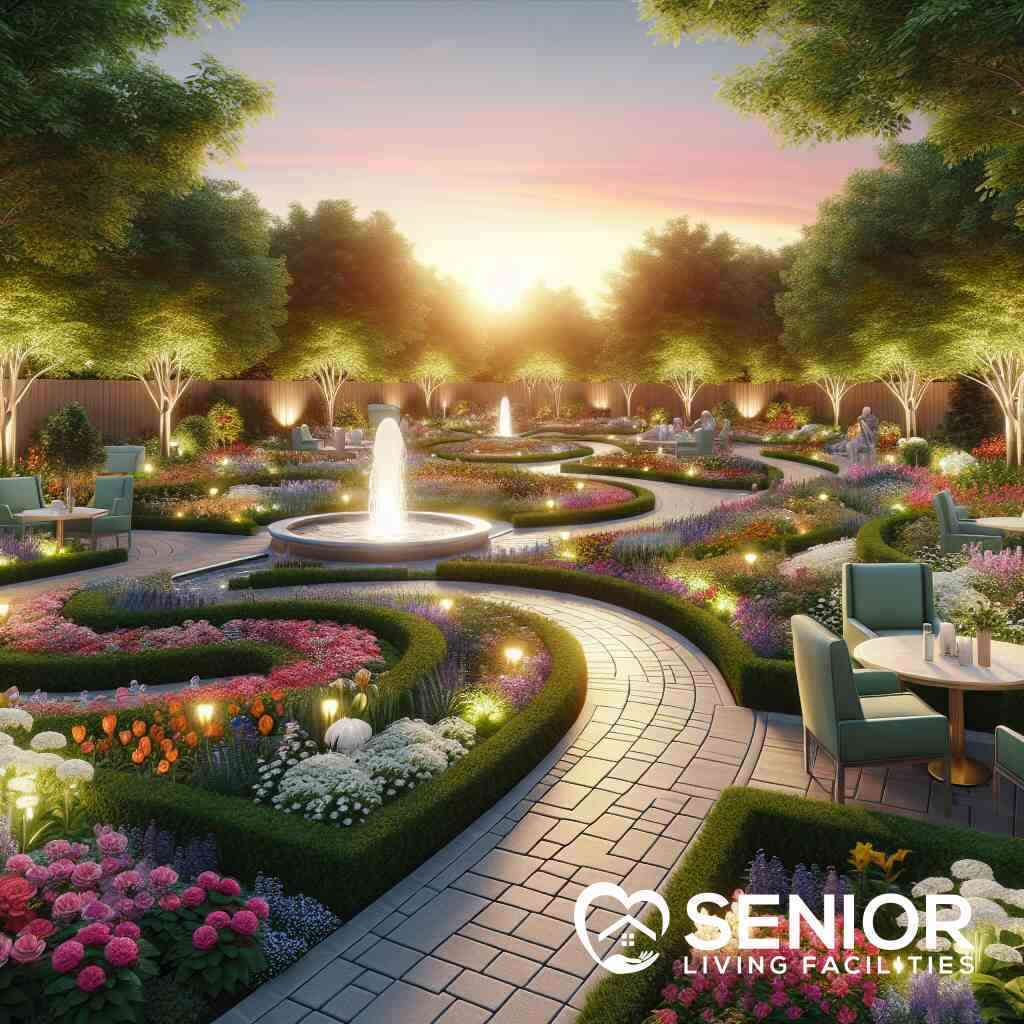
What Does Memory Care Mean in Senior Living?
August 14, 2024
Understanding Memory Care in Senior Living
Defining Memory Care Services
Memory care services represent a specialized spectrum of senior living designed specifically for individuals experiencing Alzheimer’s, dementia, and other memory-related challenges. These services are tailored to not only meet the medical and physical needs of residents but also enrich their lives through engagement, providing a sense of community and individual respect. Memory care goes beyond traditional senior care by implementing structured programs, therapies, and activities aimed at preserving cognitive functions, enhancing recognition abilities, and promoting a sense of personal worth.
The Importance of Specialized Dementia Care
The progression of conditions like Alzheimer’s and dementia calls for an intricately designed care plan that addresses the unique challenges faced by each individual. Specialized dementia care within memory care settings focuses on creating a safe, supportive, and nurturing environment. This level of care is pivotal in managing symptoms, improving quality of life, and slowing the disease’s progression through cognitive therapies and social engagement. Understanding and dealing with the behavioral and psychological symptoms of dementia require a compassionate, knowledgeable approach that specialized care provides.
How Memory Care Differs from Other Senior Living Options
Memory care distinguishes itself from other senior living options through its highly structured environment, designed with the safety and needs of individuals with memory impairments in mind. Unlike independent living or traditional nursing homes, memory care units are secure to prevent wandering, a common behavior in individuals with dementia. The staffing in a memory care facility is also distinct, with professionals trained specifically in memory care, understanding the nuances of dementia and Alzheimer’s. Programs and activities are geared towards supporting cognitive abilities and maintaining functional abilities, diverging from the recreational focus seen in other senior living arrangements. This comprehensive approach ensures not only the physical safety of residents but also their mental and emotional well-being, providing a stark contrast to less specialized senior living settings.
Memory care offers a compassionate, comprehensive approach distinct from other senior living options by integrating a deep understanding of dementia and Alzheimer’s into every aspect of care.
Benefits of Memory Care Facilities
Memory care facilities offer a wide range of benefits tailored to meet the needs of individuals living with memory impairments such as Alzheimer’s and other forms of dementia. These advantages underscore the importance of selecting a care option that not merely addresses physical needs but also places a significant emphasis on cognitive health and overall well-being.
Comprehensive Memory Care Services
At the core of memory care facilities are comprehensive services designed to cater specifically to those with memory care needs. These services range from daily personal assistance to medical monitoring, all within environments specifically structured to reduce confusion and promote clarity for residents. Senior Living Facilities are equipped with staff trained in the nuances of memory care, ensuring a high level of expertise and empathy in handling the distinct challenges faced by individuals with dementia. This all-encompassing approach ensures that every aspect of care is tailored to support the cognitive and emotional needs of the residents.
Personalized Memory Care Plans
Recognizing the individuality of each resident, memory care facilities prioritize the creation of personalized care plans. These plans take into account not only the medical history and health status of the individual but also their likes, dislikes, and lifelong habits. The goal is to craft a daily living experience that feels both familiar and supportive, enhancing the resident’s quality of life. Personalized care plans are pivotal in promoting a sense of independence, dignity, and respect.
Advanced Memory Care Techniques
Memory care facilities continually adopt advanced techniques and therapies designed to support cognitive health, such as music therapy, art therapy, and reminiscence therapy. These methods have been shown to help not only maintain cognitive functions but also provide a channel for expression and communication when traditional methods may be challenging. Through the use of these innovative practices, memory care facilities provide more than just care-they offer a path to joy and enrichment.
Supporting Independence in a Safe Environment
One of the primary benefits of memory care is the balance it strikes between support and independence. Facilities are designed with safety as a paramount consideration, featuring secure areas to prevent wandering while also allowing residents to move freely within a safe perimeter. This environment enables individuals with dementia to maintain a level of independence, with the security and support system necessary to manage the condition confidently.
Behavioral Management and Cognitive Support
Behavioral and psychological symptoms of dementia can pose significant challenges, but memory care facilities excel in providing behavioral management and cognitive support. Through a combination of individualized attention, therapeutic activities, and a structured daily routine, these communities strive to minimize distress and enhance well-being. Staff are specifically trained to approach challenging behaviors with compassion and understanding, ensuring a warm, supportive atmosphere that fosters a sense of community and belonging.
The multifaceted benefits of memory care facilities reflect a deep commitment to enriching the lives of individuals with memory impairments. From comprehensive services to personalized care and advanced therapeutic techniques, these facilities stand as a testament to the importance of specialized care for seniors living with dementia.
Choosing the Right Memory Care Community
Key Features of High-Quality Memory Care Facilities
High-quality memory care facilities provide more than just a safe environment; they offer a nurturing atmosphere that caters to the specific needs of individuals with memory impairments. Key features include specialized programs designed to enhance cognitive function, personalized care plans, and environments tailored to reduce confusion and stress. Advanced security measures are in place to ensure resident safety, while staff are expertly trained in dementia care, offering compassionate support around the clock. These facilities also prioritize family involvement, offering education and support groups to help families navigate their loved one’s care journeys.
The Role of Secure Memory Care Units
Secure memory care units play a critical role in ensuring the safety and well-being of residents with Alzheimer’s and other forms of dementia. These units are specifically designed to prevent wandering, a common and dangerous behavior among those with memory impairments. Through the use of key-coded doors, enclosed outdoor spaces, and constant surveillance, secure memory care units provide a haven that allows residents to move freely within a protected environment. Moreover, these units often feature layouts and designs that minimize confusion and promote ease of navigation, further enhancing the safety and comfort of residents.
Evaluating Compassionate Memory Care Options
When evaluating compassionate memory care options, it’s important to look beyond the basic amenities and focus on the care team’s empathy, communication, and approach to care. A compassionate memory care community will prioritize the dignity and individuality of each resident, offering personalized engagement that respects the resident’s history, preferences, and abilities. Assessing resident and family satisfaction through reviews and testimonials can provide insight into the compassion and commitment of the care team. Additionally, visiting the facility and observing interactions between staff and residents can offer valuable perspectives on the level of compassion in care.
Therapeutic Memory Care Environments
Therapeutic memory care environments are designed to soothe and stimulate the senses, providing comfort and cognitive support for residents. These environments utilize specific colors, lighting, and decorations to create a calming atmosphere while minimizing elements that could cause confusion or agitation. Sensory stimulation, through activities such as music therapy, art therapy, and garden walks, plays a significant role in enhancing residents’ well-being. Therapeutic environments also include spaces for social interaction and private reflection, supporting the diverse needs of individuals with memory impairments.
Memory Care in Assisted Living vs. Standalone Facilities
Memory care services can be found within assisted living communities or as part of standalone memory care facilities. The choice between these options depends on the individual’s specific needs and the progression of their memory impairment. Assisted living communities with memory care wings offer the benefit of a continuum of care, allowing residents to transition seamlessly as their needs change. Standalone memory care facilities, on the other hand, provide specialized care exclusively for individuals with significant memory impairments, featuring environments and programs specifically designed for intensive memory support. Understanding the distinctions and benefits of each setting is crucial in making an informed decision that best fits the unique needs of your loved one.
Programs and Activities in Memory Care

Personalizing Activities to Promote Engagement
In memory care facilities, personalizing activities is more than just a practice; it’s a philosophy that respects and honors the individuality of each resident. By tailoring programs and activities to align with residents’ interests, backgrounds, and cognitive abilities, facilities encourage their independence and support their mental functions. This personalization enhances engagement, facilitating moments of joy and connection. Creative arts, gardening, music therapy, and reminiscence exercises are examples of such personalized activities that not only cater to the unique preferences of residents but also stimulate cognitive faculties and foster a sense of achievement and self-worth.
Memory Care Activity Programs
Memory care activity programs are meticulously designed to enhance the quality of life for individuals living with dementia or Alzheimer’s disease. These programs range from cognitive exercises aimed at slowing the progression of memory loss to physical activities that promote health and reduce stress. Social events, mental games, and sensory stimulation activities are integral components of these programs, each serving a critical role in supporting residents’ mental health and emotional well-being. By participating in these activities, residents find opportunities for meaningful engagement, thereby reinforcing their connections to the world around them.
Innovative Behavioral Management in Memory Care
Innovative behavioral management in memory care incorporates various strategies and techniques to positively and constructively address the behavioral and psychological symptoms of dementia. Techniques such as validation therapy, structured routines, and environmental modifications help manage agitation, confusion, and other challenging behaviors. Facilities prioritize non-pharmacological interventions, focusing on understanding the root causes of behaviors and addressing them through compassionate, individualized approaches. This innovative management not only improves the quality of life for residents but also supports staff in creating a peaceful, supportive community environment.
The Importance of Social Connection in Memory Care
The importance of maintaining social connections in memory care cannot be overstated. Social interactions and relationships are essential for emotional well-being and can significantly impact the quality of life for those living with memory impairments. Memory care communities actively foster a sense of belonging through group activities, family involvement, and communal spaces designed to encourage interaction and companionship. By creating an inclusive, supportive atmosphere, these facilities help mitigate feelings of isolation and loneliness, affirming the value and dignity of every resident.
Encouraging Independence Through Tailored Programs
Memory care facilities emphasize encouraging independence through tailored programs that recognize each resident’s abilities and preferences. Adaptive technologies, environmental modifications, and personalized care approaches empower individuals to participate in daily living activities to the best of their abilities. Such empowerment not only promotes a sense of autonomy but also contributes to the resident’s self-esteem and overall satisfaction with life. Memory care communities understand that fostering independence involves providing the necessary support for each resident to engage with life on their terms, thus enhancing their sense of agency and fulfillment.
Finding Memory Care Near You
Utilizing Assisted Living Locators for Memory Care
Finding the right memory care facility for a loved one is a profound responsibility, filled with considerations of care, comfort, and community. Utilizing assisted living locators for memory care simplifies this daunting task. These locators, tools designed to filter through options based on personalized criteria such as location, care needs, and budget, can significantly streamline the search process. Not only do they provide a curated list of facilities, but they also offer detailed information on each, ensuring you can make an informed decision with ease. By finding senior living facilities near you, you’re taking the first step towards securing a supportive and engaging environment for your loved one.
Assessing Local Memory Care Communities for Seniors
The journey to selecting the right memory care community often begins at a local level. Assessing local memory care communities for seniors involves visiting potential sites, understanding the scope of care provided, and speaking directly with staff and residents. This hands-on approach offers invaluable insights into the daily life and operational standards of a facility. Look for communities that exhibit strong indicators of quality care, including personalized care plans, a high ratio of staff to residents, and vibrant activity schedules that encourage engagement and social interaction. Furthermore, assessing the facility’s security measures, cleanliness, and overall happiness of its residents can offer peace of mind that you’re choosing a nurturing environment for your loved one.
Connecting with Memory Care Communities Through Senior Living Facilities
Senior Living Facilities simplify the often-complicated process of finding the right memory care community by connecting families and individuals with a network of vetted memory care communities. Through their comprehensive platform, users can search for facilities based on specific memory care needs and geographic preferences. This connection is not just about finding a location; it’s about finding a community where your loved one will thrive. Detailed profiles, reviews, and direct links to memory care communities offer a transparent view of what each facility offers, empowering families to make decisions with confidence and clarity.
Comparing Memory Care Housing Solutions
The final step in finding the perfect memory care solution involves comparing the different housing options available. Memory care housing solutions vary widely, from specialized units within larger assisted living facilities to standalone memory care homes that focus exclusively on dementia and Alzheimer’s care. Each type of facility offers unique benefits, and comparing them requires consideration of several factors, including the level of care provided, the cost, the living environment, and the availability of specialized programs aimed at enhancing cognitive functions and quality of life. Understanding the differences among these options is crucial in selecting a living situation that not only meets the immediate needs of your loved one but also their long-term well-being and happiness. The journey towards finding the right memory care housing may seem arduous. Still, the peace of mind that comes with knowing your loved one is in a safe, stimulating, and supportive environment is immeasurable.
Navigating the Journey Together
The journey into memory care is a profound transition, not just for those exhibiting memory loss but also for their families and loved ones. This chapter of life, though filled with challenges, also opens doors to new forms of care, community, and connection. Senior Living Facilities stands as a beacon, guiding individuals and families through the nuances of this journey with compassion, expertise, and an unwavering commitment to enhancing the lives of seniors across all 50 states.
Building a Support System with Memory Care Services
Embarking on the memory care journey begins with building a robust support system, a cornerstone in maintaining the well-being of individuals with cognitive impairments. Memory care services extend beyond mere health care; they envelop residents in a blanket of specialized attention, understanding, and empathy. Through the integration of senior living facilities, caregivers and family members forge a comprehensive network, offering consistent, compassionate care that adapts to the evolving needs of residents.
This multidimensional support system is pivotal, ensuring that every individual’s journey is as comfortable and fulfilling as possible. From personalized care plans to engaging activities that nourish the spirit, the support provided within these communities emphasizes dignity, respect, and quality of life.
Embracing Change: The Transition to Memory Care
Transitioning to memory care is a significant change, marked by mixed emotions and adjustments for everyone involved. Embracing this change requires an understanding of the comprehensive benefits memory care facilities offer, from secure living environments to specialized programs tailored for cognitive support. This transition, when navigated thoughtfully, allows individuals to thrive, offering them opportunities to maintain their identities and continue pursuing their passions in a supportive setting.
Guiding families and individuals through this transition, Senior Living Facilities provides resources, advice, and personalized assistance to ensure a seamless move. By highlighting the importance of community and continued engagement in meaningful activities, families can find solace in knowing that their loved ones will see a new sense of belonging and purpose.
Ensuring Quality Care Through Continuous Collaboration
The essence of quality memory care lies in continuous collaboration among medical professionals, caregivers, and families. This cooperative approach facilitates an adaptable care plan that evolves with the resident’s changing needs, ensuring the highest standards of care are consistently met. Such collaboration fosters a nurturing environment where individuals with memory impairment can thrive, backed by a team of compassionate professionals dedicated to their well-being.
Senior Living Facilities emphasize the importance of open communication and partnership, enabling families to stay involved in their loved one’s care. Through this synergy, memory care communities can deliver exceptional care that not only addresses medical requirements but also supports the emotional and social needs of residents.
Looking Forward: The Future of Memory Care
As we look to the future, memory care continues to evolve, driven by advancements in research, technology, and a deeper understanding of dementia and Alzheimer’s disease. The future promises even more personalized care options, innovative therapies, and an enhanced focus on creating engaging, life-affirming environments for seniors with memory challenges.
Senior Living Facilities remain at the forefront of this evolution, committed to connecting families with cutting-edge memory care communities that offer the best in modern care techniques and environments designed to maximize the quality of life. As we journey forward, the commitment to dignity, respect, and personalized care continues to be the guiding light, ensuring that the future of memory care is bright, inclusive, and supportive for all.
Frequently Asked Questions
Question: What specialized dementia care services do Senior Living Facilities offer for those with Alzheimer’s?
Answer: Senior Living Facilities connects families and individuals with a vast network of Alzheimer’s care facilities that provide comprehensive, specialized dementia care. These facilities are designed to address the unique needs of individuals with Alzheimer’s, offering personalized memory care plans, secure memory care units to prevent wandering and a range of cognitive support programs. Our platform ensures that those in need can find high-quality memory care facilities equipped with advanced memory care techniques and compassionate, skilled professionals dedicated to enhancing the lives of seniors with memory impairments.
Question: How do Senior Living Facilities ensure the provision of compassionate memory care options?
Answer: Senior Living Facilities prioritizes the emotional and psychological well-being of residents in memory care communities. We rigorously vet memory care communities to ensure they not only provide secure, therapeutic memory care environments but also emphasize compassionate care. This includes the presence of staff trained in behavioral management in memory care, engaging activity programs tailored to individual interests, and environments that promote social connection and independence. By prioritizing facilities that demonstrate a deep understanding and respect for seniors, we ensure families can trust that their loved ones will receive care that is both dignified and empathetic.
Question: Can you explain the importance of personalized memory care plans in Senior Living Facilities’ network of communities?
Answer: Personalized memory care plans stand at the core of the memory support services provided by communities within the Senior Living Facilities network. Recognizing that every individual’s experience with memory impairment is unique, these plans are meticulously crafted to reflect the personal history, preferences, and medical needs of each resident. This personalized approach ensures that memory care services are not only effective in supporting cognitive health but also enrich the residents’ lives by respecting their individuality. Tailored activities, specialized therapies, and consistent, understanding care work together to promote a sense of purpose, dignity, and enjoyment in daily life.
Question: In the blog post “What Does Memory Care Mean in Senior Living?” how do Senior Living Facilities describe the role of secure memory care units?
Answer: In the blog post “What Does Memory Care Mean in Senior Living?”, Senior Living Facilities highlights the critical role of secure memory care units in providing a safe environment for seniors with memory impairments such as Alzheimer’s and dementia. These units are specially designed to prevent wandering and ensure the safety of residents through advanced security measures like key-coded doors and enclosed outdoor spaces. Furthermore, the layout and design of these units are thoughtfully configured to reduce confusion and ease navigation, enhancing the comfort and well-being of residents. This secure setup is essential in allowing individuals to maintain their independence within a safe perimeter, ensuring families peace of mind about their loved one’s safety and care.
Question: How do Senior Living Facilities support families in choosing the right memory care housing solutions?
Answer: Senior Living Facilities assist families in navigating the diverse options for memory care housing solutions by offering an easy-to-use platform that filters search results based on specific criteria such as location, care needs, and budget. Our service provides detailed information on both assisted living communities with memory care wings and standalone memory care facilities, offering insights into the level of care, specialized programs, and living environments offered. We also furnish reviews and direct communication links to help families make informed decisions. Our team is committed to guiding families every step of the way, ensuring they find a memory care solution that best fits their loved one’s needs and provides them with the support, care, and quality of life they deserve.



